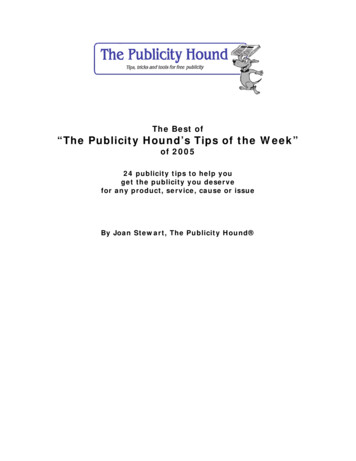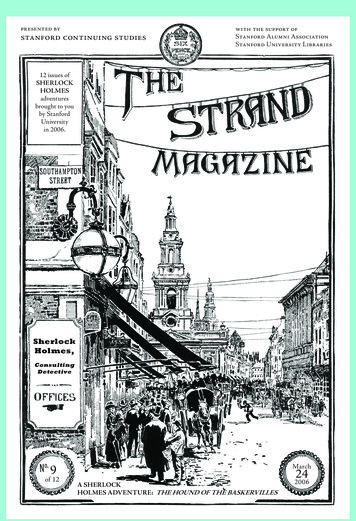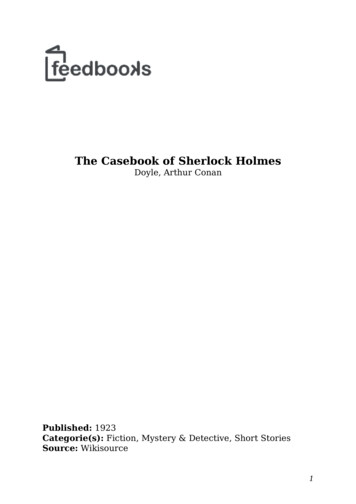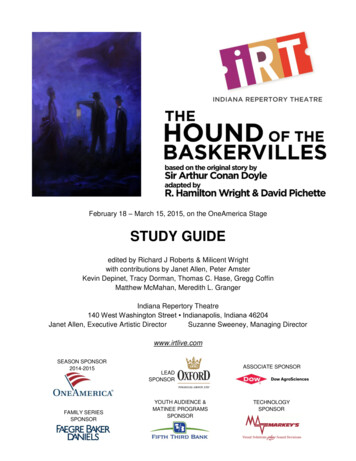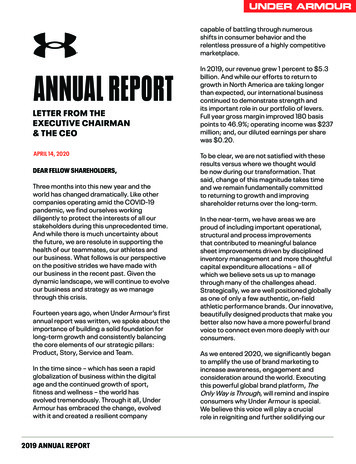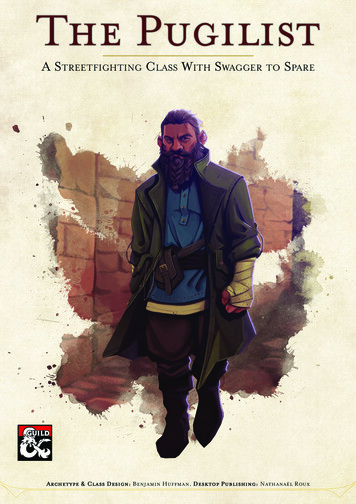
Transcription
The Hound of theBaskervillesArthur Conan DoyleThis eBook is designed and published by Planet PDF. For more freeeBooks visit our Web site at http://www.planetpdf.com/.
The Hound of the BaskervillesChapter 1Mr. Sherlock HolmesMr. Sherlock Holmes, who was usually very late in themornings, save upon those not infrequent occasions whenhe was up all night, was seated at the breakfast table. Istood upon the hearth-rug and picked up the stick whichour visitor had left behind him the night before. It was afine, thick piece of wood, bulbous-headed, of the sortwhich is known as a ‘Penang lawyer.’ Just under the headwas a broad silver band nearly an inch across. ‘To JamesMortimer, M.R.C.S., from his friends of the C.C.H.,’ wasengraved upon it, with the date ‘1884.’ It was just such astick as the old-fashioned family practitioner used tocarry—dignified, solid, and reassuring.‘Well, Watson, what do you make of it?’Holmes was sitting with his back to me, and I hadgiven him no sign of my occupation.‘How did you know what I was doing? I believe youhave eyes in the back of your head.’‘I have, at least, a well-polished, silver-plated coffee-potin front of me,’ said he. ‘But, tell me, Watson, what doyou make of our visitor’s stick? Since we have been so2 of 279
The Hound of the Baskervillesunfortunate as to miss him and have no notion of hiserrand, this accidental souvenir becomes of importance.Let me hear you reconstruct the man by an examinationof it.’‘I think,’ said I, following as far as I could the methodsof my companion, ‘that Dr. Mortimer is a successful,elderly medical man, well-esteemed since those whoknow him give him this mark of their appreciation.’‘Good!’ said Holmes. ‘Excellent!’‘I think also that the probability is in favour of his beinga country practitioner who does a great deal of his visitingon foot.’‘Why so?’‘Because this stick, though originally a very handsomeone has been so knocked about that I can hardly imagine atown practitioner carrying it. The thick-iron ferrule isworn down, so it is evident that he has done a greatamount of walking with it.’‘Perfectly sound!’ said Holmes.‘And then again, there is the ‘friends of the C.C.H.’ Ishould guess that to be the Something Hunt, the localhunt to whose members he has possibly given somesurgical assistance, and which has made him a smallpresentation in return.’3 of 279
The Hound of the Baskervilles‘Really, Watson, you excel yourself,’ said Holmes,pushing back his chair and lighting a cigarette. ‘I ambound to say that in all the accounts which you have beenso good as to give of my own small achievements youhave habitually underrated your own abilities. It may bethat you are not yourself luminous, but you are aconductor of light. Some people without possessing geniushave a remarkable power of stimulating it. I confess, mydear fellow, that I am very much in your debt.’He had never said as much before, and I must admitthat his words gave me keen pleasure, for I had often beenpiqued by his indifference to my admiration and to theattempts which I had made to give publicity to hismethods. I was proud, too, to think that I had so farmastered his system as to apply it in a way which earnedhis approval. He now took the stick from my hands andexamined it for a few minutes with his naked eyes. Thenwith an expression of interest he laid down his cigarette,and carrying the cane to the window, he looked over itagain with a convex lens.‘Interesting, though elementary,’ said he as he returnedto his favourite corner of the settee. ‘There are certainlyone or two indications upon the stick. It gives us the basisfor several deductions.’4 of 279
The Hound of the Baskervilles‘Has anything escaped me?’ I asked with some selfimportance. ‘I trust that there is nothing of consequencewhich I have overlooked?’‘I am afraid, my dear Watson, that most of yourconclusions were erroneous. When I said that youstimulated me I meant, to be frank, that in noting yourfallacies I was occasionally guided towards the truth. Notthat you are entirely wrong in this instance. The man iscertainly a country practitioner. And he walks a gooddeal.’‘Then I was right.’‘To that extent.’‘But that was all.’‘No, no, my dear Watson, not all—by no means all. Iwould suggest, for example, that a presentation to a doctoris more likely to come from a hospital than from a hunt,and that when the initials ‘C.C.’ are placed before thathospital the words ‘Charing Cross’ very naturally suggestthemselves.’‘You may be right.’‘The probability lies in that direction. And if we takethis as a working hypothesis we have a fresh basis fromwhich to start our construction of this unknown visitor.’5 of 279
The Hound of the Baskervilles‘Well, then, supposing that ‘C.C.H.’ does stand for‘Charing Cross Hospital,’ what further inferences may wedraw?’‘Do none suggest themselves? You know my methods.Apply them!’‘I can only think of the obvious conclusion that theman has practised in town before going to the country.’‘I think that we might venture a little farther than this.Look at it in this light. On what occasion would it bemost probable that such a presentation would be made?When would his friends unite to give him a pledge oftheir good will? Obviously at the moment when Dr.Mortimer withdrew from the service of the hospital inorder to start in practice for himself. We know there hasbeen a presentation. We believe there has been a changefrom a town hospital to a country practice. Is it, then,stretching our inference too far to say that the presentationwas on the occasion of the change?’‘It certainly seems probable.’‘Now, you will observe that he could not have been onthe staff of the hospital, since only a man well-establishedin a London practice could hold such a position, and sucha one would not drift into the country. What was he,then? If he was in the hospital and yet not on the staff he6 of 279
The Hound of the Baskervillescould only have been a house-surgeon or a housephysician—little more than a senior student. And he leftfive years ago—the date is on the stick. So your grave,middle-aged family practitioner vanishes into thin air, mydear Watson, and there emerges a young fellow underthirty, amiable, unambitious, absent-minded, and thepossessor of a favourite dog, which I should describeroughly as being larger than a terrier and smaller than amastiff.’I laughed incredulously as Sherlock Holmes leanedback in his settee and blew little wavering rings of smokeup to the ceiling.‘As to the latter part, I have no means of checking you,’said I, ‘but at least it is not difficult to find out a fewparticulars about the man’s age and professional career.’From my small medical shelf I took down the MedicalDirectory and turned up the name. There were severalMortimers, but only one who could be our visitor. I readhis record aloud.‘Mortimer, James, M.R.C.S., 1882, Grimpen,Dartmoor, Devon. House-surgeon, from 1882 to 1884, atCharing Cross Hospital. Winner of the Jackson prize forComparative Pathology, with essay entitled ‘Is Disease aReversion?’ Corresponding member of the Swedish7 of 279
The Hound of the BaskervillesPathological Society. Author of ‘Some Freaks of Atavism’(Lancet 1882). ‘Do We Progress?’ (Journal of Psychology,March, 1883). Medical Officer for the parishes ofGrimpen, Thorsley, and High Barrow.’‘No mention of that local hunt, Watson,’ said Holmeswith a mischievous smile, ‘but a country doctor, as youvery astutely observed. I think that I am fairly justified inmy inferences. As to the adjectives, I said, if I rememberright, amiable, unambitious, and absent-minded. It is myexperience that it is only an amiable man in this worldwho receives testimonials, only an unambitious one whoabandons a London career for the country, and only anabsent-minded one who leaves his stick and not hisvisiting-card after waiting an hour in your room.’‘And the dog?’‘Has been in the habit of carrying this stick behind hismaster. Being a heavy stick the dog has held it tightly bythe middle, and the marks of his teeth are very plainlyvisible. The dog’s jaw, as shown in the space betweenthese marks, is too broad in my opinion for a terrier andnot broad enough for a mastiff. It may have been—yes, byJove, it is a curly-haired spaniel.’8 of 279
The Hound of the BaskervillesHe had risen and paced the room as he spoke. Now hehalted in the recess of the window. There was such a ringof conviction in his voice that I glanced up in surprise.‘My dear fellow, how can you possibly be so sure ofthat?’‘For the very simple reason that I see the dog himselfon our very door-step, and there is the ring of its owner.Don’t move, I beg you, Watson. He is a professionalbrother of yours, and your presence may be of assistanceto me. Now is the dramatic moment of fate, Watson,when you hear a step upon the stair which is walking intoyour life, and you know not whether for good or ill. Whatdoes Dr. James Mortimer, the man of science, ask ofSherlock Holmes, the specialist in crime? Come in!’The appearance of our visitor was a surprise to me,since I had expected a typical country practitioner. He wasa very tall, thin man, with a long nose like a beak, whichjutted out between two keen, gray eyes, set closelytogether and sparkling brightly from behind a pair of goldrimmed glasses. He was clad in a professional but ratherslovenly fashion, for his frock-coat was dingy and histrousers frayed. Though young, his long back was alreadybowed, and he walked with a forward thrust of his headand a general air of peering benevolence. As he entered his9 of 279
The Hound of the Baskervilleseyes fell upon the stick in Holmes’s hand, and he rantowards it with an exclamation of joy. ‘I am so very glad,’said he. ‘I was not sure whether I had left it here or in theShipping Office. I would not lose that stick for the world.’‘A presentation, I see,’ said Holmes.‘Yes, sir.’‘From Charing Cross Hospital?’‘From one or two friends there on the occasion of mymarriage.’‘Dear, dear, that’s bad!’ said Holmes, shaking his head.Dr. Mortimer blinked through his glasses in mildastonishment.‘Why was it bad?’‘Only that you have disarranged our little deductions.Your marriage, you say?’‘Yes, sir. I married, and so left the hospital, and with itall hopes of a consulting practice. It was necessary to makea home of my own.’‘Come, come, we are not so far wrong, after all,’ saidHolmes. ‘And now, Dr. James Mortimer ———‘‘Mister, sir, Mister—a humble M.R.C.S.’‘And a man of precise mind, evidently.’‘A dabbler in science, Mr. Holmes, a picker up of shellson the shores of the great unknown ocean. I presume that10 of 279
The Hound of the Baskervillesit is Mr. Sherlock Holmes whom I am addressing and not———‘‘No, this is my friend Dr. Watson.’‘Glad to meet you, sir. I have heard your namementioned in connection with that of your friend. Youinterest me very much, Mr. Holmes. I had hardlyexpected so dolichocephalic a skull or such well-markedsupra-orbital development. Would you have any objectionto my running my finger along your parietal fissure? A castof your skull, sir, until the original is available, would bean ornament to any anthropological museum. It is not myintention to be fulsome, but I confess that I covet yourskull.’Sherlock Holmes waved our strange visitor into a chair.‘You are an enthusiast in your line of thought, I perceive,sir, as I am in mine,’ said he. ‘I observe from yourforefinger that you make your own cigarettes. Have nohesitation in lighting one.’The man drew out paper and tobacco and twirled theone up in the other with surprising dexterity. He hadlong, quivering fingers as agile and restless as the antennaeof an insect.Holmes was silent, but his little darting glances showedme the interest which he took in our curious companion.11 of 279
The Hound of the Baskervilles‘I presume, sir,’ said he at last, ‘that it was not merelyfor the purpose of examining my skull that you have doneme the honour to call here last night and again to-day?’‘No, sir, no; though I am happy to have had theopportunity of doing that as well. I came to you, Mr.Holmes, because I recognized that I am myself anunpractical man and because I am suddenly confrontedwith a most serious and extraordinary problem.Recognizing, as I do, that you are the second highestexpert in Europe ———‘‘Indeed, sir! May I inquire who has the honour to bethe first?’ asked Holmes with some asperity.‘To the man of precisely scientific mind the work ofMonsieur Bertillon must always appeal strongly.’‘Then had you not better consult him?’‘I said, sir, to the precisely scientific mind. But as apractical man of affairs it is acknowledged that you standalone. I trust, sir, that I have not inadvertently ———‘‘Just a little,’ said Holmes. ‘I think, Dr. Mortimer, youwould do wisely if without more ado you would kindlytell me plainly what the exact nature of the problem is inwhich you demand my assistance.’12 of 279
The Hound of the BaskervillesChapter 2The Curse of the Baskervilles‘I have in my pocket a manuscript,’ said Dr. JamesMortimer.‘I observed it as you entered the room,’ said Holmes.‘It is an old manuscript.’‘Early eighteenth century, unless it is a forgery.’‘How can you say that, sir?’‘You have presented an inch or two of it to myexamination all the time that you have been talking. Itwould be a poor expert who could not give the date of adocument within a decade or so. You may possibly haveread my little monograph upon the subject. I put that at1730.’‘The exact date is 1742.’ Dr. Mortimer drew it from hisbreast-pocket. ‘This family paper was committed to mycare by Sir Charles Baskerville, whose sudden and tragicdeath some three months ago created so much excitementin Devonshire. I may say that I was his personal friend aswell as his medical attendant. He was a strong-mindedman, sir, shrewd, practical, and as unimaginative as I ammyself. Yet he took this document very seriously, and his13 of 279
The Hound of the Baskervillesmind was prepared for just such an end as did eventuallyovertake him.’Holmes stretched out his hand for the manuscript andflattened it upon his knee.‘You will observe, Watson, the alternative use of thelong s and the short. It is one of several indications whichenabled me to fix the date.’I looked over his shoulder at the yellow paper and thefaded script. At the head was written: ‘Baskerville Hall,’and below in large, scrawling figures: ‘1742.’‘It appears to be a statement of some sort.’‘Yes, it is a statement of a certain legend which runs inthe Baskerville family.’‘But I understand that it is something more modernand practical upon which you wish to consult me?’‘Most modern. A most practical, pressing matter, whichmust be decided within twenty-four hours. But themanuscript is short and is intimately connected with theaffair. With your permission I will read it to you.’Holmes leaned back in his chair, placed his finger-tipstogether, and closed his eyes, with an air of resignation.Dr. Mortimer turned the manuscript to the light and readin a high, cracking voice the following curious, old-worldnarrative:—14 of 279
The Hound of the Baskervilles‘Of the origin of the Hound of the Baskervilles therehave been many statements, yet as I come in a direct linefrom Hugo Baskerville, and as I had the story from myfather, who also had it from his, I have set it down with allbelief that it occurred even as is here set forth. And Iwould have you believe, my sons, that the same Justicewhich punishes sin may also most graciously forgive it, andthat no ban is so heavy but that by prayer and repentanceit may be removed. Learn then from this story not to fearthe fruits of the past, but rather to be circumspect in thefuture, that those foul passions whereby our family hassuffered so grievously may not again be loosed to ourundoing.‘Know then that in the time of the Great Rebellion(the history of which by the learned Lord Clarendon Imost earnestly commend to your attention) this Manor ofBaskerville was held by Hugo of that name, nor can it begainsaid that he was a most wild, profane, and godlessman. This, in truth, his neighbours might have pardoned,seeing that saints have never flourished in those parts, butthere was in him a certain wanton and cruel humourwhich made his name a byword through the West. Itchanced that this Hugo came to love (if, indeed, so dark apassion may be known under so bright a name) the15 of 279
The Hound of the Baskervillesdaughter of a yeoman who held lands near the Baskervilleestate. But the young maiden, being discreet and of goodrepute, would ever avoid him, for she feared his evilname. So it came to pass that one Michaelmas this Hugo,with five or six of his idle and wicked companions, stoledown upon the farm and carried off the maiden, her fatherand brothers being from home, as he well knew. Whenthey had brought her to the Hall the maiden was placed inan upper chamber, while Hugo and his friends sat down toa long carouse, as was their nightly custom. Now, thepoor lass upstairs was like to have her wits turned at thesinging and shouting and terrible oaths which came up toher from below, for they say that the words used by HugoBaskerville, when he was in wine, were such as might blastthe man who said them. At last in the stress of her fear shedid that which might have daunted the bravest or mostactive man, for by the aid of the growth of ivy whichcovered (and still covers) the south wall she came downfrom under the eaves, and so homeward across the moor,there being three leagues betwixt the Hall and her father’sfarm.‘It chanced that some little time later Hugo left hisguests to carry food and drink—with other worse things,perchance—to his captive, and so found the cage empty16 of 279
The Hound of the Baskervillesand the bird escaped. Then, as it would seem, he becameas one that hath a devil, for, rushing down the stairs intothe dining-hall, he sprang upon the great table, flagons andtrenchers flying before him, and he cried aloud before allthe company that he would that very night render hisbody and soul to the Powers of Evil if he might butovertake the wench. And while the revellers stood aghastat the fury of the man, one more wicked or, it may be,more drunken than the rest, cried out that they should putthe hounds upon her. Whereat Hugo ran from the house,crying to his grooms that they should saddle his mare andunkennel the pack, and giving the hounds a kerchief ofthe maid’s, he swung them to the line, and so off full cryin the moonlight over the moor.‘Now, for some space the revellers stood agape, unableto understand all that had been done in such haste. Butanon their bemused wits awoke to the nature of the deedwhich was like to be done upon the moorlands.Everything was now in an uproar, some calling for theirpistols, some for their horses, and some for another flask ofwine. But at length some sense came back to their crazedminds, and the whole of them, thirteen in number, tookhorse and started in pursuit. The moon shone clear abovethem, and they rode swiftly abreast, taking that course17 of 279
The Hound of the Baskervilleswhich the maid must needs have taken if she were toreach her own home.‘They had gone a mile or two when they passed one ofthe night shepherds upon the moorlands, and they cried tohim to know if he had seen the hunt. And the man, as thestory goes, was so crazed with fear that he could scarcespeak, but at last he said that he had indeed seen theunhappy maiden, with the hounds upon her track. ‘But Ihave seen more than that,’ said he, ‘for Hugo Baskervillepassed me upon his black mare, and there ran mute behindhim such a hound of hell as God forbid should ever be atmy heels.’ So the drunken squires cursed the shepherd androde onward. But soon their skins turned cold, for therecame a galloping across the moor, and the black mare,dabbled with white froth, went past with trailing bridleand empty saddle. Then the revellers rode close together,for a great fear was on them, but they still followed overthe moor, though each, had he been alone, would havebeen right glad to have turned his horse’s head. Ridingslowly in this fashion they came at last upon the hounds.These, though known for their valour and their breed,were whimpering in a cluster at the head of a deep dip orgoyal, as we call it, upon the moor, some slinking away18 of 279
The Hound of the Baskervillesand some, with starting hackles and staring eyes, gazingdown the narrow valley before them.‘The company had come to a halt, more sober men, asyou may guess, than when they started. The most of themwould by no means advance, but three of them, theboldest, or it may be the most drunken, rode forwarddown the goyal. Now, it opened into a broad space inwhich stood two of those great stones, still to be seenthere, which were set by certain forgotten peoples in thedays of old. The moon was shining bright upon theclearing, and there in the centre lay the unhappy maidwhere she had fallen, dead of fear and of fatigue. But itwas not the sight of her body, nor yet was it that of thebody of Hugo Baskerville lying near her, which raised thehair upon the heads of these three daredevil roysterers, butit was that, standing over Hugo, and plucking at his throat,there stood a foul thing, a great, black beast, shaped like ahound, yet larger than any hound that ever mortal eye hasrested upon. And even as they looked the thing tore thethroat out of Hugo Baskerville, on which, as it turned itsblazing eyes and dripping jaws upon them, the threeshrieked with fear and rode for dear life, still screaming,across the moor. One, it is said, died that very night of19 of 279
The Hound of the Baskervilleswhat he had seen, and the other twain were but brokenmen for the rest of their days.‘Such is the tale, my sons, of the coming of the houndwhich is said to have plagued the family so sorely eversince. If I have set it down it is because that which isclearly known hath less terror than that which is buthinted at and guessed. Nor can it be denied that many ofthe family have been unhappy in their deaths, which havebeen sudden, bloody, and mysterious. Yet may we shelterourselves in the infinite goodness of Providence, whichwould not forever punish the innocent beyond that thirdor fourth generation which is threatened in Holy Writ. Tothat Providence, my sons, I hereby commend you, and Icounsel you by way of caution to forbear from crossingthe moor in those dark hours when the powers of evil areexalted.‘[This from Hugo Baskerville to his sons Rodger andJohn, with instructions that they say nothing thereof totheir sister Elizabeth.]"When Dr. Mortimer had finished reading this singularnarrative he pushed his spectacles up on his forehead andstared across at Mr. Sherlock Holmes. The latter yawnedand tossed the end of his cigarette into the fire.‘Well?’ said he.20 of 279
The Hound of the Baskervilles‘Do you not find it interesting?’‘To a collector of fairy tales.’Dr. Mortimer drew a folded newspaper out of hispocket.‘Now, Mr. Holmes, we will give you something a littlemore recent. This is the Devon County Chronicle of May14th of this year. It is a short account of the facts elicitedat the death of Sir Charles Baskerville which occurred afew days before that date.’My friend leaned a little forward and his expressionbecame intent. Our visitor readjusted his glasses andbegan:—‘The recent sudden death of Sir Charles Baskerville,whose name has been mentioned as the probable Liberalcandidate for Mid-Devon at the next election, has cast agloom over the county. Though Sir Charles had resided atBaskerville Hall for a comparatively short period hisamiability of character and extreme generosity had wonthe affection and respect of all who had been brought intocontact with him. In these days of nouveaux riches it isrefreshing to find a case where the scion of an old countyfamily which has fallen upon evil days is able to make hisown fortune and to bring it back with him to restore thefallen grandeur of his line. Sir Charles, as is well known,21 of 279
The Hound of the Baskervillesmade large sums of money in South African speculation.More wise than those who go on until the wheel turnsagainst them, he realized his gains and returned to Englandwith them. It is only two years since he took up hisresidence at Baskerville Hall, and it is common talk howlarge were those schemes of reconstruction andimprovement which have been interrupted by his death.Being himself childless, it was his openly expressed desirethat the whole country-side should, within his ownlifetime, profit by his good fortune, and many will havepersonal reasons for bewailing his untimely end. Hisgenerous donations to local and county charities have beenfrequently chronicled in these columns.‘The circumstances connected with the death of SirCharles cannot be said to have been entirely cleared up bythe inquest, but at least enough has been done to disposeof those rumours to which local superstition has given rise.There is no reason whatever to suspect foul play, or toimagine that death could be from any but natural causes.Sir Charles was a widower, and a man who may be said tohave been in some ways of an eccentric habit of mind. Inspite of his considerable wealth he was simple in hispersonal tastes, and his indoor servants at Baskerville Hallconsisted of a married couple named Barrymore, the22 of 279
The Hound of the Baskervilleshusband acting as butler and the wife as housekeeper.Their evidence, corroborated by that of several friends,tends to show that Sir Charles’s health has for some timebeen impaired, and points especially to some affection ofthe heart, manifesting itself in changes of colour,breathlessness, and acute attacks of nervous depression. Dr.James Mortimer, the friend and medical attendant of thedeceased, has given evidence to the same effect.‘The facts of the case are simple. Sir Charles Baskervillewas in the habit every night before going to bed ofwalking down the famous Yew Alley of Baskerville Hall.The evidence of the Barrymores shows that this had beenhis custom. On the 4th of May Sir Charles had declaredhis intention of starting next day for London, and hadordered Barrymore to prepare his luggage. That night hewent out as usual for his nocturnal walk, in the course ofwhich he was in the habit of smoking a cigar. He neverreturned. At twelve o’clock Barrymore, finding the halldoor still open, became alarmed, and, lighting a lantern,went in search of his master. The day had been wet, andSir Charles’s footmarks were easily traced down the Alley.Half-way down this walk there is a gate which leads outon to the moor. There were indications that Sir Charleshad stood for some little time here. He then proceeded23 of 279
The Hound of the Baskervillesdown the Alley, and it was at the far end of it that hisbody was discovered. One fact which has not beenexplained is the statement of Barrymore that his master’sfootprints altered their character from the time that hepassed the moor-gate, and that he appeared from thenceonward to have been walking upon his toes. OneMurphy, a gipsy horse-dealer, was on the moor at no greatdistance at the time, but he appears by his own confessionto have been the worse for drink. He declares that heheard cries, but is unable to state from what direction theycame. No signs of violence were to be discovered uponSir Charles’s person, and though the doctor’s evidencepointed to an almost incredible facial distortion—so greatthat Dr. Mortimer refused at first to believe that it wasindeed his friend and patient who lay before him—it wasexplained that that is a symptom which is not unusual incases of dyspnoea and death from cardiac exhaustion. Thisexplanation was borne out by the post-mortemexamination, which showed long-standing organic disease,and the coroner’s jury returned a verdict in accordancewith the medical evidence. It is well that this is so, for it isobviously of the utmost importance that Sir Charles’s heirshould settle at the Hall and continue the good workwhich has been so sadly interrupted. Had the prosaic24 of 279
The Hound of the Baskervillesfinding of the coroner not finally put an end to theromantic stories which have been whispered in connectionwith the affair, it might have been difficult to find a tenantfor Baskerville Hall. It is understood that the next of kin isMr. Henry Baskerville, if he be still alive, the son of SirCharles Baskerville’s younger brother. The young manwhen last heard of was in America, and inquiries are beinginstituted with a view to informing him of his goodfortune.’Dr. Mortimer refolded his paper and replaced it in hispocket.‘Those are the public facts, Mr. Holmes, in connectionwith the death of Sir Charles Baskerville.’‘I must thank you,’ said Sherlock Holmes, ‘for callingmy attention to a case which certainly presents somefeatures of interest. I had observed some newspapercomment at the time, but I was exceedingly preoccupiedby that little affair of the Vatican cameos, and in myanxiety to oblige the Pope I lost touch with severalinteresting English cases. This article, you say, contains allthe public facts?’‘It does.’25 of 279
The Hound of the Baskervilles‘Then let me have the private ones.’ He leaned back,put his finger-tips together, and assumed his mostimpassive and judicial expression.‘In doing so,’ said Dr. Mortimer, who had begun toshow signs of some strong emotion, ‘I am telling thatwhich I have not confided to anyone. My motive forwithholding it from the coroner’s inquiry is that a man ofscience shrinks from placing himself in the public positionof seeming to indorse a popular superstition. I had thefurther motive that Baskerville Hall, as the paper says,would certainly remain untenanted if anything were doneto increase its already rather grim reputation. For boththese reasons I thought that I was justified in telling ratherless than I knew, since no practical good could result fromit
eyes fell upon the stick in Holmes's hand, and he ran towards it with an exclamation of joy. 'I am so very glad,' said he. 'I was not sure whether I had left it here or in the Shipping Office. I would not lose that stick for the world.' 'A presentation, I see,' said Holmes. 'Yes, sir.' 'From Charing Cross Hospital?'
